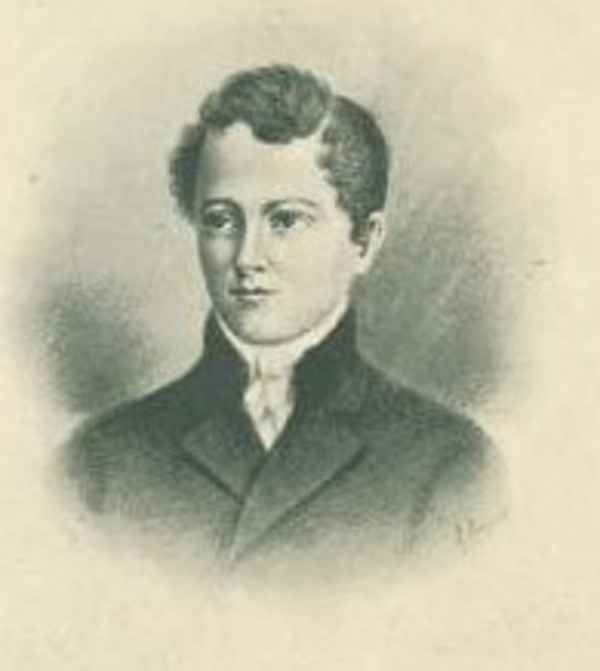
Source: Link
LÉVESQUE, CHARLES-FRANÇOIS, lawyer, Patriote, and poet; b. 19 Oct. 1817 in Montreal, son of Marc-Antoine-Louis Lévesque, a protonotary, and Charlotte-Mélanie Panet; d. 3 Nov. 1859 in Sainte-Mélanie, Lower Canada.
Charles-François Lévesque, a grandson of judge Pierre-Louis Panet*, belonged to a bourgeois family of Montreal. In 1825 his father was stricken with paralysis, and his doctor recommended a stay in the country. The Lévesque family accordingly went to live in Berthier-en-Haut (Berthierville). The following year young Charles-François entered the Petit Séminaire de Montréal, where he received a classical education that he completed in 1834. That year he began his legal training under two prominent Montreal lawyers, Samuel Wentworth Monk and Robert Lester Morrogh; however, he had to break off his studies because of the rebellion.
As a fiery liberal, Lévesque espoused the nationalist philosophy in 1837 and even took a public stand in favour of the Patriotes. Believing that his safety was threatened, he thought it expedient to seek temporary refuge in the United States. A year later his brother Guillaume Lévesque, who was two years younger, took an active part in the second uprising, was arrested, and was sentenced to death. Fortunately, through the intervention of his loyal friends, among them Philippe Panet, he was pardoned but nevertheless had to go into exile in France.
In 1839, when the situation had returned to normal, Charles-François came back to Lower Canada. He then resumed his studies and was called to the bar on 9 Jan. 1840. That year he decided to leave Montreal and take up residence at Berthier-en-Haut, where he opened a law office. There, on 14 June 1843, he married Mary Jessy Morrison, a young woman from the American west. From then on he divided his time between his wife, whom he adored, and his profession. But 11 months after their marriage his wife died while giving birth to a girl, Marie-Jessie-Béatrice. Lévesque was profoundly shaken by this loss: in an instant his whole world had collapsed. Under this traumatic shock he suffered a nervous breakdown that brought him to the edge of madness. He subsequently went to live with his mother at Sainte-Mélanie.
During the latter part of his life Lévesque, who was now stricken with neurasthenia, devoted himself entirely to his mother and daughter and to poetry, which became for him an indispensable refuge. From 1845 until the year of his death, he published some 50 poems in various newspapers and periodicals, including La Revue canadienne, L’Aurore des Canadas, Le Canadien, Le Moniteur canadien, and La Minerve, all of Montreal, and L’Écho des campagnes of Berthier-en-Haut.
Lévesque’s poetry was strongly influenced by his state of mind. Suffering as he did from “romantic discontent,” he was better able than most of his contemporaries to express this feeling in verse. He sought particularly to describe the evils and misfortunes of society, and to evoke death. But also, under the influence of his masters, Lamartine, Burns, and Longfellow, in the manner of intimiste poetry he celebrated pure love, tenderness, woman and her fine sensibilities, the joys and sorrows of life, and his own faith. His youthful experiences and romantic humanism led him also to write patriotic poetry, in which he sang the glory and grandeur of the Patriotes of 1837–38.
In the matter of form, Lévesque must be considered an innovator. First, modelling himself on Hugues-Félicité-Robert de La Mennais, he introduced poetry written in biblical verse form into French Canadian literature. Then, after the fashion of Gérard de Nerval, he crafted a number of charming poems in free verse in which he frequently alternated alexandrines and hexameters, his favourite lines, sometimes substituting octosyllabics for hexameters.
But in the midst of his preoccupations Lévesque continued to be haunted by the painful memory of his wife’s death. On 3 Nov. 1859, having made up his mind to do away with himself, he gave as a pretext that he was going hunting in a nearby forest. There he put an end to his life with a shot in the head. The jury charged with inquiring into the circumstances of his passing nevertheless returned a verdict of accidental death.
Charles-François Lévesque, an heir to the pre-romantic tradition represented in Lower Canada by the poet and historian François-Xavier Garneau*, succeeded in imparting a romantic direction to poetic themes and expression. As an innovator he gave fresh life to the rigid structures which too often had confined the stanza, in particular by using as a model the biblical verse form. Like his contemporaries Joseph Lenoir*, dit Rolland, and Octave Crémazie*, he prepared the way for the rich period of grandiloquent French Canadian romanticism in the 1860s.
ANQ-M, CE1-51, 20 oct. 1817; CE5-1, 14 juin 1843, 17 mai 1844; CE5-8, 8 nov. 1859. Le Canadien, 14 nov. 1859. Mélanges religieux, 30 sept. 1851. La Minerve, 10 nov. 1859. F.-J. Audet, “Commissions d’avocats de la province de Québec, 1765 à 1849,” BRH, 39 (1933): 589. DOLQ, 1: XXXIII–VII, 591–93. Fauteux, Patriotes, 301–2. J.-J. Lefebvre, “Brevets de cléricature des avocats de Montréal au deuxième quart du
Guy Champagne, “LÉVESQUE, CHARLES-FRANÇOIS,” in Dictionary of Canadian Biography, vol. 8, University of Toronto/Université Laval, 2003–, accessed December 1, 2024, http://www.biographi.ca/en/bio/levesque_charles_francois_8E.html.
The citation above shows the format for footnotes and endnotes according to the Chicago manual of style (16th edition). Information to be used in other citation formats:
| Permalink: | http://www.biographi.ca/en/bio/levesque_charles_francois_8E.html |
| Author of Article: | Guy Champagne |
| Title of Article: | LÉVESQUE, CHARLES-FRANÇOIS |
| Publication Name: | Dictionary of Canadian Biography, vol. 8 |
| Publisher: | University of Toronto/Université Laval |
| Year of publication: | 1985 |
| Year of revision: | 1985 |
| Access Date: | December 1, 2024 |